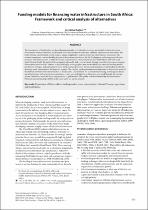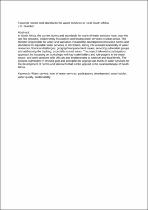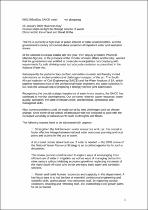 ResearchSpace
ResearchSpace
Funding models for financing water infrastructure in South Africa: framework and critical analysis of alternatives
JavaScript is disabled for your browser. Some features of this site may not work without it.
- ResearchSpace
- →
- Research Publications/Outputs
- →
- Journal Articles
- →
- View Item
| dc.contributor.author |
Ruiters, C

|
|
| dc.date.accessioned | 2014-05-26T05:53:27Z | |
| dc.date.available | 2014-05-26T05:53:27Z | |
| dc.date.issued | 2013-04 | |
| dc.identifier.citation | Ruiters, C. 2013. Funding models for financing water infrastructure in South Africa: framework and critical analysis of alternatives. Water SA, vol. 39(2), pp 313-326 | en_US |
| dc.identifier.issn | 0378-4738 | |
| dc.identifier.uri | http://www.ajol.info/index.php/wsa/article/viewFile/88094/77736 | |
| dc.identifier.uri | http://hdl.handle.net/10204/7434 | |
| dc.description | Copyright: 2013 Water Research Commission. Water SA, vol. 39(2), pp 313-326 | en_US |
| dc.description.abstract | The Government of South Africa has been the main provider of public infrastructure, particularly in the water sector. Government administration and institutional structures continue to shape and influence infrastructure investment. The South African constitutional system imposes unique complexities and constraints on infrastructure investment. The country experiences a serious backlog in water infrastructure investment for the development and management of water resources and water services. In 2011, this under-investment was estimated at more than R600 billion (600 x 109 ZAR: South African Rand). The national Government traditionally had a pivotal role in shaping water infrastructure investment. Government needs to find a solution to this backlog by putting in place new institutional structures and funding models for effective strategies leading to prompt water infrastructure provision. The research identified several funding models for financing water infrastructure development projects. The existing public provision model continues to characterise much of the publicly-provided water infrastructure in South Africa. These models see Government planning, installing and financing infrastructure with pricing at marginal costs or on a loss-making basis, with returns recovered through the taxation system. Nowadays, water infrastructure provision is split between fully-public and mixed ownership by water entities. Public-private partnerships (PPPs) in the water sector are not yet a reality. | en_US |
| dc.language.iso | en | en_US |
| dc.publisher | Water Research Commission | en_US |
| dc.relation.ispartofseries | Workflow;12694 | |
| dc.subject | Department of Water Affairs | en_US |
| dc.subject | Water infrastructure | en_US |
| dc.subject | Water infrastructure funding models | en_US |
| dc.subject | National treasury | en_US |
| dc.subject | Public infrastructure | en_US |
| dc.subject | Water resources | en_US |
| dc.title | Funding models for financing water infrastructure in South Africa: framework and critical analysis of alternatives | en_US |
| dc.type | Article | en_US |
| dc.identifier.apacitation | Ruiters, C. (2013). Funding models for financing water infrastructure in South Africa: framework and critical analysis of alternatives. http://hdl.handle.net/10204/7434 | en_ZA |
| dc.identifier.chicagocitation | Ruiters, C "Funding models for financing water infrastructure in South Africa: framework and critical analysis of alternatives." (2013) http://hdl.handle.net/10204/7434 | en_ZA |
| dc.identifier.vancouvercitation | Ruiters C. Funding models for financing water infrastructure in South Africa: framework and critical analysis of alternatives. 2013; http://hdl.handle.net/10204/7434. | en_ZA |
| dc.identifier.ris | TY - Article AU - Ruiters, C AB - The Government of South Africa has been the main provider of public infrastructure, particularly in the water sector. Government administration and institutional structures continue to shape and influence infrastructure investment. The South African constitutional system imposes unique complexities and constraints on infrastructure investment. The country experiences a serious backlog in water infrastructure investment for the development and management of water resources and water services. In 2011, this under-investment was estimated at more than R600 billion (600 x 109 ZAR: South African Rand). The national Government traditionally had a pivotal role in shaping water infrastructure investment. Government needs to find a solution to this backlog by putting in place new institutional structures and funding models for effective strategies leading to prompt water infrastructure provision. The research identified several funding models for financing water infrastructure development projects. The existing public provision model continues to characterise much of the publicly-provided water infrastructure in South Africa. These models see Government planning, installing and financing infrastructure with pricing at marginal costs or on a loss-making basis, with returns recovered through the taxation system. Nowadays, water infrastructure provision is split between fully-public and mixed ownership by water entities. Public-private partnerships (PPPs) in the water sector are not yet a reality. DA - 2013-04 DB - ResearchSpace DP - CSIR KW - Department of Water Affairs KW - Water infrastructure KW - Water infrastructure funding models KW - National treasury KW - Public infrastructure KW - Water resources LK - https://researchspace.csir.co.za PY - 2013 SM - 0378-4738 T1 - Funding models for financing water infrastructure in South Africa: framework and critical analysis of alternatives TI - Funding models for financing water infrastructure in South Africa: framework and critical analysis of alternatives UR - http://hdl.handle.net/10204/7434 ER - | en_ZA |








